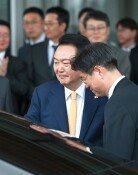Minjoo Party efforts to legislate economic democratization bills
Minjoo Party efforts to legislate economic democratization bills
Posted July. 06, 2016 08:33,
Updated July. 06, 2016 09:05
The main opposition Minjoo Party has completed the blueprint of "economic democratization" pursued by its interim chief Kim Jong-in, and is accelerating efforts to legislate them in the 20th National Assembly.
The party’s Policy Committee has prepared bills to materialize economic democratization and "embracing growth," which Kim proposed as "agenda of this era" in his speech as the head of a parliamentary negotiating bloc. “The biggest challenge the Republic of Korea is facing is the economic crisis,” Kim said in his speech on June 21. “We should accurately predict the future, and prepare new economic structure.”
A flurry of bills with the Kim Jong-in stamp proposed by Minjoo Party lawmakers for respective standing committees, including a revision bill for the Commercial Code, the first of the bills that was submitted by Kim himself, are awaiting for submission and deliberation. The bill, which was also pursued in the 19th General Assembly, includes introduction of multiple derivative suit that enables a shareholder who owns 1 percent or more of stakes in the parent company to seek lawsuit against executive(s) of a subsidiary company for the latter’s wrongdoings.
Rep. Choi Un-yeol, the economic brain for the party, also proposed the fair trade and anti-monopoly act, which seeks to discard the Fair Trade Commission’s exclusive right to file a legal complaint. A revision bill of the corporate tax act, which seeks to raise the corporate tax rate for companies with 50 billion won (about 40 million U.S. dollars) or more each in taxable income, from 22 percent to 25 percent, has also been proposed. On these bills, companies have expressed opposition saying they could dampen business activities and investment, heralding heated debate during the approval process in the 20th National Assembly.
As measure for embracing growth aimed at improving income polarization, the party seeks to expand assistance to help increase income of non-regular workers and low-income people, and increase public-sector jobs including firefighters and police officers. It also seeks to double the subsidy for conversion of non-regular workers into regular employees to 12 million won (10,300 dollars) per person, and expand the scope of workers entitled to employment subsidies to include workers with an annual salary of up to 35 million won (30,200 dollars). A revision bill of the basic pension act that seeks to raise the basic pension to 300,000 won (259 dollars) per person a month has also been proposed.
Also included in a slew of proposed bills are a measure to reshuffle the Public Safety and Security Ministry back to the National Emergency Management Agency and the Korea Coast Guard, and a measure to seek joint public hearings by the Strategy and Finance Committee, the Trade, Industry and Energy Committee, and the Political Affairs Committee ahead of restructuring of the shipbuilding industry, which are not directly related to economic democratization, heralding looming controversy. “Kim completed review of the bills in person as part of well-prepared strategy for the party to regain power,” Kim’s aide said, “The measures reflect our commitment to realize economic democratization, whoever will become (the party’s) presidential candidate.”
길진균기자 leon@donga.com · 우경임기자 woohaha@donga.com







